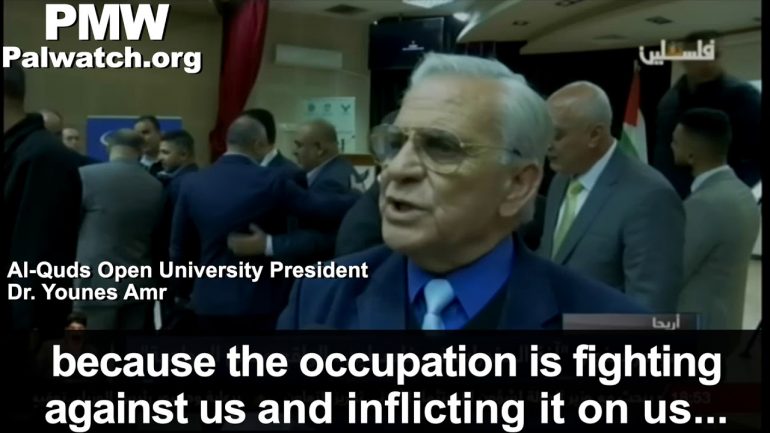Though British media outlets covering the region subject nearly every Israeli moral failure to something akin to a forensic examination, Palestinians (as we’ve documented continually) are usually spared this level of scrutiny – representing a pattern of double standards that egregiously skew reports about the conflict.
The latest example of disturbing behavior by a PA minister that likely won’t be reported by the media involves his promotion of a bizarre anti-Israel conspiracy theory , per a report by Palestinian Media Watch (PMW):
PMW notes that the charge that Israel spreads drugs (and AIDS) in Palestinian society has actually been promoted countless times by PA officials, including even Mahmoud Abbas.
However, rather than focusing on the media’s failure to cover this libel, let’s consider instead how high level Palestinian officials promoting such conspiracies reflects on their society. For starters, we know from polling that such conspiratorial thinking – especially of the antisemitic variety – is quite common amongst Palestinians. A staggering 88% of Palestinians, for instance, believe both that Jews have too much control over global affairs and the global media. And, 78% think Jews are responsible for most of the world’s wars. Other conspiracy theories widely accepted in Palestinian society involve the claim that Israel is trying to destroy al-Aqsa Mosque, and that it steals Palestinian organs.
Why does this matter? Because, it gets to the heart of the question of why a slim majority of Israelis still support two states, but are nonetheless extremely cautious in proceeding, out of concern for what kind of Palestinian state would come into being.
The media often frames the coolness to two states by recent Israeli governments, and the fact that most centre and centre-right opposition parties tend to either downplay the Palestinian issue, or avoid talking about it altogether, as a reflection of the country’s continuing move “right”. Whilst the word “right” itself is misused by the media, and used as more of a pejorative rather than an objective ideological description, the fact that most Israelis have indeed grown wary of the logic of Oslo does not reflect any affection towards the status quo in the West Bank, which most concede is untenable in the long-term. Rather, it’s nurtured by the trauma of the 2nd Intifada, frustration over multiple Palestinian rejections of real Israeli peace offers, the rise of Hamas following the Gaza pull-out, the failure of the ‘Arab Spring’ to facilitate regional democracy, and PA leaders who express little if any interest in inculcating a culture of peace, liberalism and tolerance.
The promotion and acceptance within their society of conspiracy theories like the one we highlighted above only fuels Israelis’ profound skepticism that, even if their leaders did one day agree to two states, the state would be a responsible state actor and prevent extremist groups like Hamas – whose ideologically driven wish to annihilate Israel is immutable – to obtain political power.
Walter Russell Mead persuasively argued that “attributing global events to the machinations of an all-conquering Jewish conspiracy is the sign of profound mental and social failure—and a harbinger of more failures and errors to come”. “Societies”, he continued, that are “in thrall to this kind of darkness…and whose intellectual leaders cannot understand how power works in the modern world…are unlikely to develop the vigorous, forward-looking and competent civil societies that can promote true democracy”. The prevalence of such delusional conspiracy thinking, Mead adds, represents a “tell” that points to important limits on a country’s “potential for political, social and economic progress”.
Whilst the media – and most international diplomats – focus almost entirely on settlements as an obstacle to two states, they all but ignore such Palestinian pathologies – reactionary and irrational ideas that are inimical to peace, progress and responsible self-rule. Until such behavior is called out with the same fervor and moral force as condemnation of the settlements, Palestinians will have little incentive to embark on a real program for reform, and Israelis will have little reason for hope that two states will actually achieve peace.
Related Articles
- At Reuters, another “incident” strikes (CAMERA)
- BBC News framing of Iranian forces in Syria (BBC Watch)
- Indy mocks Israel for “culturally appropriating” shawarma (UK Media Watch)





